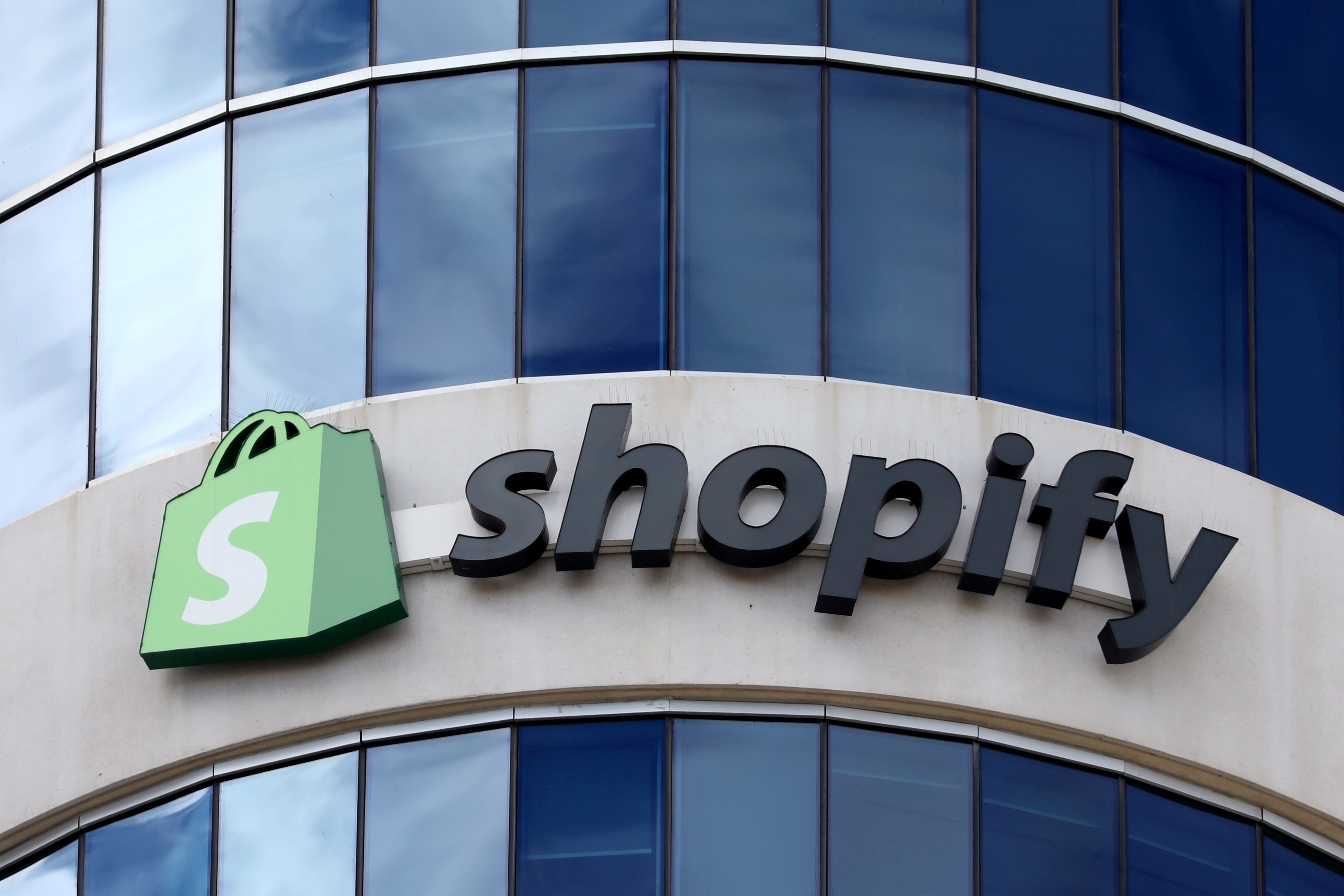Shopify Inc. (NYSE:SHOP) is set to mark its 10th anniversary of its initial public offering: A Decade of Growth

- Shopify Inc. (NYSE:SHOP) is set to mark its 10th anniversary of its initial public offering (IPO), showcasing significant growth with a market capitalization of over $126 billion.
- The company's stock price currently stands at $76.89, with a year's trading range between $48.56 and $129.38, indicating market volatility but strong investor interest.
- Despite recent declines, Shopify's substantial market cap and trading volume highlight its resilience and potential for continued success in the e-commerce sector.
Shopify Inc., a leading e-commerce platform provider, is expected to go public on the NASDAQ. Founded in Ottawa, Canada, Shopify has become a major player in the e-commerce industry, offering tools for businesses to create online stores. It competes with other e-commerce giants like Amazon and eBay, providing a unique platform for small to medium-sized businesses.
Next month marks the 10th anniversary of Shopify's initial public offering (IPO). Over the past decade, Shopify has grown significantly, becoming Canada's second-largest company by market capitalization. The Ottawa-based company has surpassed a market cap of $126 billion, showcasing its impressive growth trajectory despite recent stock price fluctuations.
Shopify's current stock price is $76.89, reflecting a decrease of 6.56% or $5.40. During the trading day, the stock has fluctuated between a low of $69.84 and a high of $78.27. Despite this decline, Shopify's growth remains noteworthy, as highlighted by its market capitalization of approximately $100.59 billion.
Over the past year, Shopify's stock has reached a high of $129.38 and a low of $48.56. This range indicates the volatility in the stock market, yet Shopify continues to maintain a strong position. Today's trading volume for Shopify is 29.71 million shares, indicating active investor interest in the company.
As Shopify prepares to list on the NASDAQ, its performance over the past decade and current market position highlight its potential for continued growth. Despite recent stock price declines, Shopify's market capitalization and trading volume suggest a resilient and promising future in the e-commerce industry.
| Symbol | Price | %chg |
|---|---|---|
| CRM.BA | 20130 | 0.3 |
| GOTO.JK | 57 | -1.75 |
| 462870.KS | 41250 | -1.09 |
| 012510.KS | 82100 | -3.65 |

Shopify Inc. (NYSE:SHOP) is set to mark its 10th anniversary of its initial public offering: A Decade of Growth
- Shopify Inc. (NYSE:SHOP) is set to mark its 10th anniversary of its initial public offering (IPO), showcasing significant growth with a market capitalization of over $126 billion.
- The company's stock price currently stands at $76.89, with a year's trading range between $48.56 and $129.38, indicating market volatility but strong investor interest.
- Despite recent declines, Shopify's substantial market cap and trading volume highlight its resilience and potential for continued success in the e-commerce sector.
Shopify Inc., a leading e-commerce platform provider, is expected to go public on the NASDAQ. Founded in Ottawa, Canada, Shopify has become a major player in the e-commerce industry, offering tools for businesses to create online stores. It competes with other e-commerce giants like Amazon and eBay, providing a unique platform for small to medium-sized businesses.
Next month marks the 10th anniversary of Shopify's initial public offering (IPO). Over the past decade, Shopify has grown significantly, becoming Canada's second-largest company by market capitalization. The Ottawa-based company has surpassed a market cap of $126 billion, showcasing its impressive growth trajectory despite recent stock price fluctuations.
Shopify's current stock price is $76.89, reflecting a decrease of 6.56% or $5.40. During the trading day, the stock has fluctuated between a low of $69.84 and a high of $78.27. Despite this decline, Shopify's growth remains noteworthy, as highlighted by its market capitalization of approximately $100.59 billion.
Over the past year, Shopify's stock has reached a high of $129.38 and a low of $48.56. This range indicates the volatility in the stock market, yet Shopify continues to maintain a strong position. Today's trading volume for Shopify is 29.71 million shares, indicating active investor interest in the company.
As Shopify prepares to list on the NASDAQ, its performance over the past decade and current market position highlight its potential for continued growth. Despite recent stock price declines, Shopify's market capitalization and trading volume suggest a resilient and promising future in the e-commerce industry.

Shopify Inc. (NASDAQ:SHOP) Innovates in E-commerce with New Partnerships and Offerings
- Shopify Inc. (NASDAQ:SHOP) introduces Splitit Card Installments app for seamless payment options and partners with Coveo to enhance customer experiences through AI-driven search and discovery.
- The company's stock price reflects active investor interest despite market fluctuations, with a current price of $96.68 and a trading volume of 12,574,125 shares.
- Shopify's robust ecosystem and strategic partnerships set it apart in the competitive e-commerce platform space, positioning it for continued growth and innovation.
Shopify Inc. (NASDAQ:SHOP) is a leading e-commerce platform that empowers businesses to create online stores and manage their sales. As Shopify prepares to go public on the NASDAQ, it continues to innovate and expand its offerings. The company faces competition from other e-commerce platforms like WooCommerce and BigCommerce, but its robust ecosystem and partnerships set it apart.
Splitit has introduced a new app, Splitit Card Installments, specifically for Shopify merchants. This app simplifies the payment process by integrating directly into Shopify's checkout, offering a seamless one-click installment payment option. This reduces the friction often associated with pay-over-time solutions, which can lead to cart abandonment. The app's white-label approach allows merchants to maintain control over their customer journey and data.
Coveo, a new Shopify Premier Technology Partner, is collaborating with Shopify to enhance customer experiences. Coveo's AI Search and Product Discovery solutions are now available in the Shopify App Store. This partnership aims to drive profitable growth for enterprises by integrating AI-Relevance capabilities, which enhance search and product discovery, as highlighted by Peter Curran, General Manager of Commerce at Coveo.
Shopify's stock price is currently $96.68, reflecting a decrease of 5.70% today. The stock has fluctuated between $95.87 and $100.26 during the trading day. Over the past year, Shopify's stock has seen a high of $129.38 and a low of $48.56. With a market capitalization of approximately $125.18 billion, Shopify remains a significant player in the e-commerce industry.
Today's trading volume for Shopify is 12,574,125 shares, indicating active investor interest. As Shopify continues to innovate and expand its partnerships, it remains a key player in the e-commerce space, offering merchants a comprehensive platform to grow their businesses.

Shopify Inc. (NASDAQ:SHOP) Innovates in E-commerce with New Partnerships and Offerings
- Shopify Inc. (NASDAQ:SHOP) introduces Splitit Card Installments app for seamless payment options and partners with Coveo to enhance customer experiences through AI-driven search and discovery.
- The company's stock price reflects active investor interest despite market fluctuations, with a current price of $96.68 and a trading volume of 12,574,125 shares.
- Shopify's robust ecosystem and strategic partnerships set it apart in the competitive e-commerce platform space, positioning it for continued growth and innovation.
Shopify Inc. (NASDAQ:SHOP) is a leading e-commerce platform that empowers businesses to create online stores and manage their sales. As Shopify prepares to go public on the NASDAQ, it continues to innovate and expand its offerings. The company faces competition from other e-commerce platforms like WooCommerce and BigCommerce, but its robust ecosystem and partnerships set it apart.
Splitit has introduced a new app, Splitit Card Installments, specifically for Shopify merchants. This app simplifies the payment process by integrating directly into Shopify's checkout, offering a seamless one-click installment payment option. This reduces the friction often associated with pay-over-time solutions, which can lead to cart abandonment. The app's white-label approach allows merchants to maintain control over their customer journey and data.
Coveo, a new Shopify Premier Technology Partner, is collaborating with Shopify to enhance customer experiences. Coveo's AI Search and Product Discovery solutions are now available in the Shopify App Store. This partnership aims to drive profitable growth for enterprises by integrating AI-Relevance capabilities, which enhance search and product discovery, as highlighted by Peter Curran, General Manager of Commerce at Coveo.
Shopify's stock price is currently $96.68, reflecting a decrease of 5.70% today. The stock has fluctuated between $95.87 and $100.26 during the trading day. Over the past year, Shopify's stock has seen a high of $129.38 and a low of $48.56. With a market capitalization of approximately $125.18 billion, Shopify remains a significant player in the e-commerce industry.
Today's trading volume for Shopify is 12,574,125 shares, indicating active investor interest. As Shopify continues to innovate and expand its partnerships, it remains a key player in the e-commerce space, offering merchants a comprehensive platform to grow their businesses.

Shopify Beats Q4 Estimates, but Stock Drops on Rising Costs and Growth Outlook
Shopify (NYSE:SHOP) delivered better-than-expected fourth-quarter results, but shares slumped 8% in pre-market today as investors reacted to a mixed outlook and rising expenses in the coming quarter.
For Q4, the e-commerce giant reported earnings per share of $0.44, slightly exceeding analyst expectations of $0.43. Revenue surged to $2.81 billion, surpassing the $2.73 billion consensus estimate, reflecting continued strong demand across its platform.
Shopify’s Merchant Solutions revenue climbed to $2.15 billion, outpacing the forecast of $2.08 billion, while subscription revenue hit $666 million, exceeding expectations of $652.1 million. However, monthly recurring revenue fell short, coming in at $178 million compared to the anticipated $182.4 million.
Looking ahead, Shopify forecasts mid-20% revenue growth for Q1 2025, aligning closely with analysts' expectations of a 24.4% YoY increase to $2.31 billion. However, investors were concerned about rising operating expenses, which Shopify expects to rise to 41%-42% of revenue in Q1, up significantly from 31.5% in the holiday quarter.

Shopify Beats Q4 Estimates, but Stock Drops on Rising Costs and Growth Outlook
Shopify (NYSE:SHOP) delivered better-than-expected fourth-quarter results, but shares slumped 8% in pre-market today as investors reacted to a mixed outlook and rising expenses in the coming quarter.
For Q4, the e-commerce giant reported earnings per share of $0.44, slightly exceeding analyst expectations of $0.43. Revenue surged to $2.81 billion, surpassing the $2.73 billion consensus estimate, reflecting continued strong demand across its platform.
Shopify’s Merchant Solutions revenue climbed to $2.15 billion, outpacing the forecast of $2.08 billion, while subscription revenue hit $666 million, exceeding expectations of $652.1 million. However, monthly recurring revenue fell short, coming in at $178 million compared to the anticipated $182.4 million.
Looking ahead, Shopify forecasts mid-20% revenue growth for Q1 2025, aligning closely with analysts' expectations of a 24.4% YoY increase to $2.31 billion. However, investors were concerned about rising operating expenses, which Shopify expects to rise to 41%-42% of revenue in Q1, up significantly from 31.5% in the holiday quarter.

Shopify Inc. (NYSE:SHOP) Earnings Preview and Financial Stability Analysis
- Shopify Inc. (NYSE:SHOP) is anticipated to release its quarterly earnings on February 11, 2025, with an estimated EPS of $0.44 and projected revenue of $2.73 billion.
- The company's Gross Merchandise Volume (GMV) showcases its significant role in the e-commerce ecosystem, often rivaling Amazon's online sales.
- Despite facing challenges, Shopify's stock has seen a nearly 150% increase over the past five years, supported by strong revenue and GMV performance.
Shopify Inc. (NYSE:SHOP) is a major player in the e-commerce industry, known for its robust platform that supports a vast network of merchant clients. The company is set to release its quarterly earnings on February 11, 2025, with Wall Street analysts estimating an earnings per share (EPS) of $0.44 and projected revenue of $2.73 billion. Shopify's influence in the e-commerce market is significant, even though it often operates behind the scenes on merchant websites.
Shopify's gross merchandise volume (GMV) has, at times, nearly matched Amazon's online and third-party sales, underscoring its substantial role in the e-commerce ecosystem. Despite Amazon's dominance with a 38% share of the U.S. e-commerce market, Shopify's GMV highlights its position as a stealth leader. This reflects the value of transactions across its extensive merchant network, making it a favorite among investors.
Recently, Shopify's stock faced a decline after Amazon's Q4 results announcement on February 6. However, the upcoming release of Shopify's year-end 2024 results could be crucial for investors. The e-commerce sector's growth as a larger portion of retail sales suggests a promising outlook for Shopify, despite the challenges of pandemic fluctuations, inflation, and interest rate changes.
Shopify's stock has rebounded significantly, with a nearly 150% increase over the past five years. This growth is supported by strong revenue and GMV performance, although the company's enterprise market penetration and international expansion have been slow and costly. Shopify's high valuation, with a price-to-earnings ratio of 109.45, requires consistent growth to maintain its market position.
Financially, Shopify has a price-to-sales ratio of about 18.46 and an enterprise value to sales ratio of roughly 18.41, indicating a premium valuation. The enterprise value to operating cash flow ratio is around 104.39, reflecting its valuation relative to cash flow. With a low debt-to-equity ratio of 0.11 and a strong current ratio of approximately 7.10, Shopify demonstrates financial stability, despite risks from earnings volatility and tariffs impacting its merchants.







